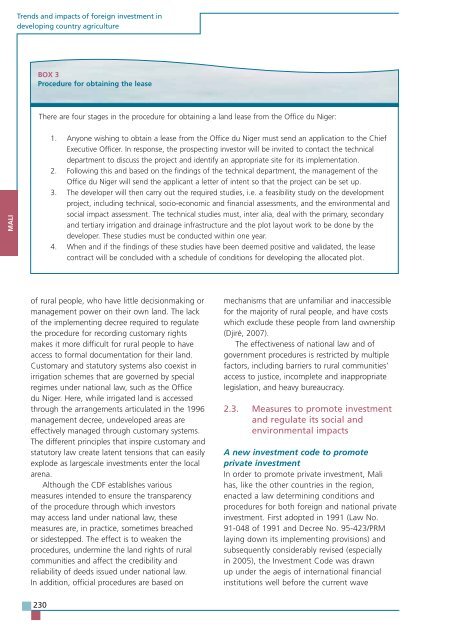TRENDS AND IMPACTS OF FOREIGN INVESTMENT IN DEVELOPING COUNTRY AGRICULTURE
TRENDS AND IMPACTS OF FOREIGN INVESTMENT IN DEVELOPING COUNTRY AGRICULTURE
TRENDS AND IMPACTS OF FOREIGN INVESTMENT IN DEVELOPING COUNTRY AGRICULTURE
Create successful ePaper yourself
Turn your PDF publications into a flip-book with our unique Google optimized e-Paper software.
MALI<br />
Trends and impacts of foreign investment in<br />
developing country agriculture<br />
BOX 3<br />
Procedure for obtaining the lease<br />
There are four stages in the procedure for obtaining a land lease from the Office du Niger:<br />
of rural people, who have little decisionmaking or<br />
management power on their own land. The lack<br />
of the implementing decree required to regulate<br />
the procedure for recording customary rights<br />
makes it more difficult for rural people to have<br />
access to formal documentation for their land.<br />
Customary and statutory systems also coexist in<br />
irrigation schemes that are governed by special<br />
regimes under national law, such as the Office<br />
du Niger. Here, while irrigated land is accessed<br />
through the arrangements articulated in the 1996<br />
management decree, undeveloped areas are<br />
effectively managed through customary systems.<br />
The different principles that inspire customary and<br />
statutory law create latent tensions that can easily<br />
explode as largescale investments enter the local<br />
arena.<br />
Although the CDF establishes various<br />
measures intended to ensure the transparency<br />
of the procedure through which investors<br />
may access land under national law, these<br />
measures are, in practice, sometimes breached<br />
or sidestepped. The effect is to weaken the<br />
procedures, undermine the land rights of rural<br />
communities and affect the credibility and<br />
reliability of deeds issued under national law.<br />
In addition, official procedures are based on<br />
230<br />
1. Anyone wishing to obtain a lease from the Office du Niger must send an application to the Chief<br />
Executive Officer. In response, the prospecting investor will be invited to contact the technical<br />
department to discuss the project and identify an appropriate site for its implementation.<br />
2. Following this and based on the findings of the technical department, the management of the<br />
Office du Niger will send the applicant a letter of intent so that the project can be set up.<br />
3. The developer will then carry out the required studies, i.e. a feasibility study on the development<br />
project, including technical, socio-economic and financial assessments, and the environmental and<br />
social impact assessment. The technical studies must, inter alia, deal with the primary, secondary<br />
and tertiary irrigation and drainage infrastructure and the plot layout work to be done by the<br />
developer. These studies must be conducted within one year.<br />
4. When and if the findings of these studies have been deemed positive and validated, the lease<br />
contract will be concluded with a schedule of conditions for developing the allocated plot.<br />
mechanisms that are unfamiliar and inaccessible<br />
for the majority of rural people, and have costs<br />
which exclude these people from land ownership<br />
(Djiré, 2007).<br />
The effectiveness of national law and of<br />
government procedures is restricted by multiple<br />
factors, including barriers to rural communities’<br />
access to justice, incomplete and inappropriate<br />
legislation, and heavy bureaucracy.<br />
2.3. Measures to promote investment<br />
and regulate its social and<br />
environmental impacts<br />
A new investment code to promote<br />
private investment<br />
In order to promote private investment, Mali<br />
has, like the other countries in the region,<br />
enacted a law determining conditions and<br />
procedures for both foreign and national private<br />
investment. First adopted in 1991 (Law No.<br />
91-048 of 1991 and Decree No. 95-423/PRM<br />
laying down its implementing provisions) and<br />
subsequently considerably revised (especially<br />
in 2005), the Investment Code was drawn<br />
up under the aegis of international financial<br />
institutions well before the current wave


